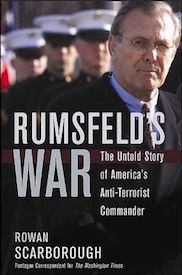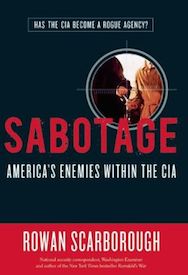Rumsfeld’s War
Donald Rumsfeld, the colorful, eloquent, insightful, and energetic Defense Secretary, has become a national hero for his expert handling of the war on terror — and the whipping boy of defeatist media jackals looking for any excuse to declare a “quagmire.” Now “Rumsfeld’s War” shows you this great man’s true measure. It takes you inside Rumsfeld’s Pentagon, detailing the far-sighted, courageous decisions he has made to enable our military to fight this most unconventional of wars effectively.
Rumsfeld’s War reveals how the Secretary of Defense has been at the center of global counterterrorism operations from their beginning. In fact, he saw a major terrorist attack on American soil coming long before 9/11. When terrorists crashed a plane into the Pentagon, he was there — helping carry the wounded to safety. He was the first Bush White House official to break with Bill Clinton’s policy and call the struggle against terrorism a war, instead of a law enforcement issue. Throughout the war on terror he has worked fourteen hours a day, directing armies overseas, fighting interior bureaucratic battles, and working to transform America’s armed forces to make sure that an attack like 9/11 never happens again.
Rowan Scarborough, veteran national security reporter for the Washington Times, here recounts heated conflicts Rumsfeld has had with other Bush Administration officials (as well as entrenched Pentagon bureaucrats) over crucial elements of our response to terrorism. He even gives details of Rumsfeld’s tangles with generals and foreign leaders over the most effective response to terror. This book traces the immense extent of Rumsfeld’s labors and his influence, showing how he has almost single-handedly reconfigured key components of our military response: the role of special operations forces, our reaction to hostage-takers, our treatment of captured al Qaeda terrorists, and even the wartime chain of command.
Many of Rumsfeld’s hard-won victories are revealed here for the first time: Scarborough interviewed scores of Rumsfeld’s friends and colleagues, including former President Gerald Ford, renowned economist Arthur Laffer, and Newt Gingrich. He also provides details of some highly secretive Pentagon operations — carried out under Rumsfeld’s supervision by groups that most Americans don’t even know exist. Scarborough even offers an enlightening historical long view, comparing Rumsfeld’s decisiveness and willingness to act to the Clinton Administration’s lassitude, distraction, and wrongheadedness during al Qaeda’s astonishingly rapid rise in the 1990s. He shows that Rumsfeld saw the importance of this present conflict early on, when he said shortly before Kabul surrendered: “I firmly believe that this is the most important tasking the U.S. military has been handed since the Second World War. And what’s at stake here is no less than our freedom to exist as an American people. So there’s no option but success.” Among Rowan Scarborough’s revelations:
- “This is not a criminal action. This is war.” How this succinct 9/11 statement from Rumsfeld transformed the American response to terrorism
- The all-important (and, up to now, secret) orders and unprecedented power that Rumsfeld gave to Special Operations units such as the Delta Force, SEALs, and Green Berets early in the war on terror
- Rumsfeld’s new territorial approach to fighting terrorism — how it has kept the fighting in Baghdad instead of Boise
- How Rumsfeld convinced skeptical world leaders (including even the President of Yemen) to let American personnel battle al Qaeda on their soil
- Rumsfeld’s bureaucratic victories: how they streamlined America’s war on terror chain of command, maximizing our efficiency
- The showdown between Rumsfeld and Colin Powell over the status of al Qaeda and Taliban prisoners: what it reveals about differing priorities and goals within the Bush Administration
- “I’m not even going to bother talking to you”: Rumsfeld’s barbed response to an interview request from liberal scandalmonger Bob Woodward
- Grey Fox: the astonishing exploits of this super-secret unit of army commandos working under “deep cover,” using false identities and nationalities — revealed here for the first time
- “Have you killed anyone yet?” Rumsfeld’s breathtakingly direct question to dithering, temporizing military commanders
- Frustrations and unexpected turns in the hunt for weapons of mass destruction in Iraq
- Rumsfeld the man: how his early career prepared him for the immense responsibilities he discharges so faithfully today
- Congressman Rumsfeld: how he helped revitalize a small, demoralized Republican minority in the 1960s House
- “Don Rumsfeld was probably the toughest boss I ever had. . . . It had a huge impact on my life, literally changed my whole career”: Vice President Cheney’s clear-eyed, affectionate appraisal of the man he worked for in the Nixon White House
- Henry Kissinger: why Rumsfeld fought him relentlessly inside the Ford administration, opposing the SALT II treaty and arguing that the administration should be vocal about the Soviet threat
- Rumsfeld’s decisive behind-the-scenes contributions to both parties’ acceptance of the necessity for missile defense
- Private citizen Rumsfeld’s 1999 trip to China: how he put the Communists on notice of what they could expect from a Republican administration
- How Defense Secretary Rumsfeld won his first of many battles with Foggy Bottom — and sent a signal of new American toughness to the Red Chinese in the process
- Women in the military: how Rumsfeld restored a bit of common sense to this politicized debate by presiding over a major downsizing of the Defense Advisory Committee on Women in the Services (DACOWITS)
- How Rumsfeld did nothing less than change the military’s overriding mission in the aftermath of 9/11
- Plus: details from the Defense Intelligence Agency’s secret report on likely developments in global hotspots between now and 2020
Scarborough concludes that history will surely judge Rumsfeld as “one of America’s most important defense leaders.” Rumsfeld’s War reveals why — and how much of the bold new military strategy and vision that we are implementing now in the war on terror we owe to one man: Donald Rumsfeld.
Tags: Rowan Scarborough, Rumsfeld's War
- The Author

Rowan Scarborough
Rowan Scarborough has covered the Pentagon for the Washington Times for fifteen years and is one of the most respected––and […] More about Rowan Scarborough.
- Books by the Author















